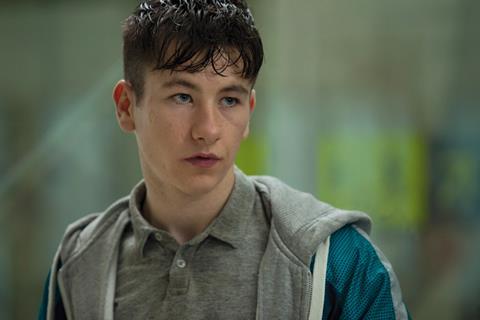Dir. Rebecca Daly. Ireland/Luxembourg/Netherlands, 2015. 99 mins

The second feature from director Rebecca Daly and screenwriting partner Glenn Montgomery follows The Other Side Of Sleep (2011) with a further intense exploration of grief, loss and isolation. More approachable than their dreamy, elliptical debut, it is still a dour, slow-burning drama that is more likely to attract widespread festival attention than significant theatrical suitors. The subject matter and treatment suggest some commercial parallels with Toni Colette/Jack Reynor tale Glassland. In Mammal, sensitively judged, totally committed performances from Rachel Griffiths and Barry Keoghan carry a tale that edges towards Greek tragedy in its treatment of the fragile, twisted bond between mothers and sons.
The raw vulnerability of the two performances creates a rock solid centre to this delicately handled immersion in love and grief.
Margaret (Griffiths) is very much a woman who is filling her days rather than living a life. She works in a charity shop and takes solitary pleasure in swimming at a local baths. Stray cats are the only friends that she has. Her sense of detachment from the world seems to be a form of self-imposed exile that ends when her former husband Matt (Michael McElhatton) makes contact to inform her that their teenage son has gone missing.
The disappearance of the son she abandoned in infancy coincides with Margaret’s decision to give shelter to homeless teenager Joe (Barry Keoghan). The fact that this appears to happen on the very slimmest of acquaintances is one of the few elements of the plotting that feels blatantly manufactured even if it essential to what follows. As Margaret and Joe grow more comfortable in each other’s company, the film wades into tricky territory where it is uncertain whether Margaret is attracted to Joe as a surrogate son or a potential lover. When Matt donates the son’s old clothes to the charity shop and Joe starts wearing them, there is even an echo of Hitchcock’s Vertigo with Margaret either consciously or subconsciously trying to makeover one teenager in the manner of the boy she never knew.
Understated and tightly focused, Mammal makes strenuous efforts to dampen down any sense of overheated melodrama or possible sense of outrage in the growing intimacy between Margaret and Joe. Scenes in which she bathes the injured teenager or is obliged to touch him when she teaches him to swim are all sensitively handled. They grow naturally from what has become a very believable, complex relationship that recognises a need in both of them for human contact.
Unfolding mostly in claustrophobic everyday settings of bars, shops and unremarkable household rooms, Mammal is very much in a social realist tradition where we feel that events are rooted in real life and universal feelings. Rachel Griffiths’ performance is equally unshowy and shaped in the subtlest flicker of emotion; a rueful creasing of the eyes, a rare smile of happiness or an anxious frown as Margaret is confronted by emotions that she has seemed determined to keep at arm’s length.
Barry Keoghan has the cheek and brass neck of the teenage Joe down to perfection but also creates a deeper sense of a conflicted young man drawn towards something more meaningful than anything life has presented him with in the past. The raw vulnerability of their performances creates a rock solid centre to this delicately handled immersion in love and grief.
Production Companies: Fastnet Films, Calach Films, Les Films Fauves, Rinkel Film
International sales: Picture Tree International pti@picturetree-international.com
Producers: Macdara Kelleher, Conor Barry
Executive producers: John Kelleher, Rory Gilmartin
Screenwriters: Rebecca Daly, Glenn Montgomery
Cinematography: Lennart Verstegen
Editor: Halina Daugird
Production designer: Audrey Hernu
Music: Rutger Reinders
Cast: Rachel Griffiths, Barry Keoghan, Michael McElhatton






![The Brightest SunScreen[Courtesy HKIFF]](https://d1nslcd7m2225b.cloudfront.net/Pictures/274x183/3/5/0/1448350_thebrightestsunscreencourtesyhkiff_312678.jpg)















![The Brightest SunScreen[Courtesy HKIFF]](https://d1nslcd7m2225b.cloudfront.net/Pictures/100x67/3/5/0/1448350_thebrightestsunscreencourtesyhkiff_312678.jpg)

